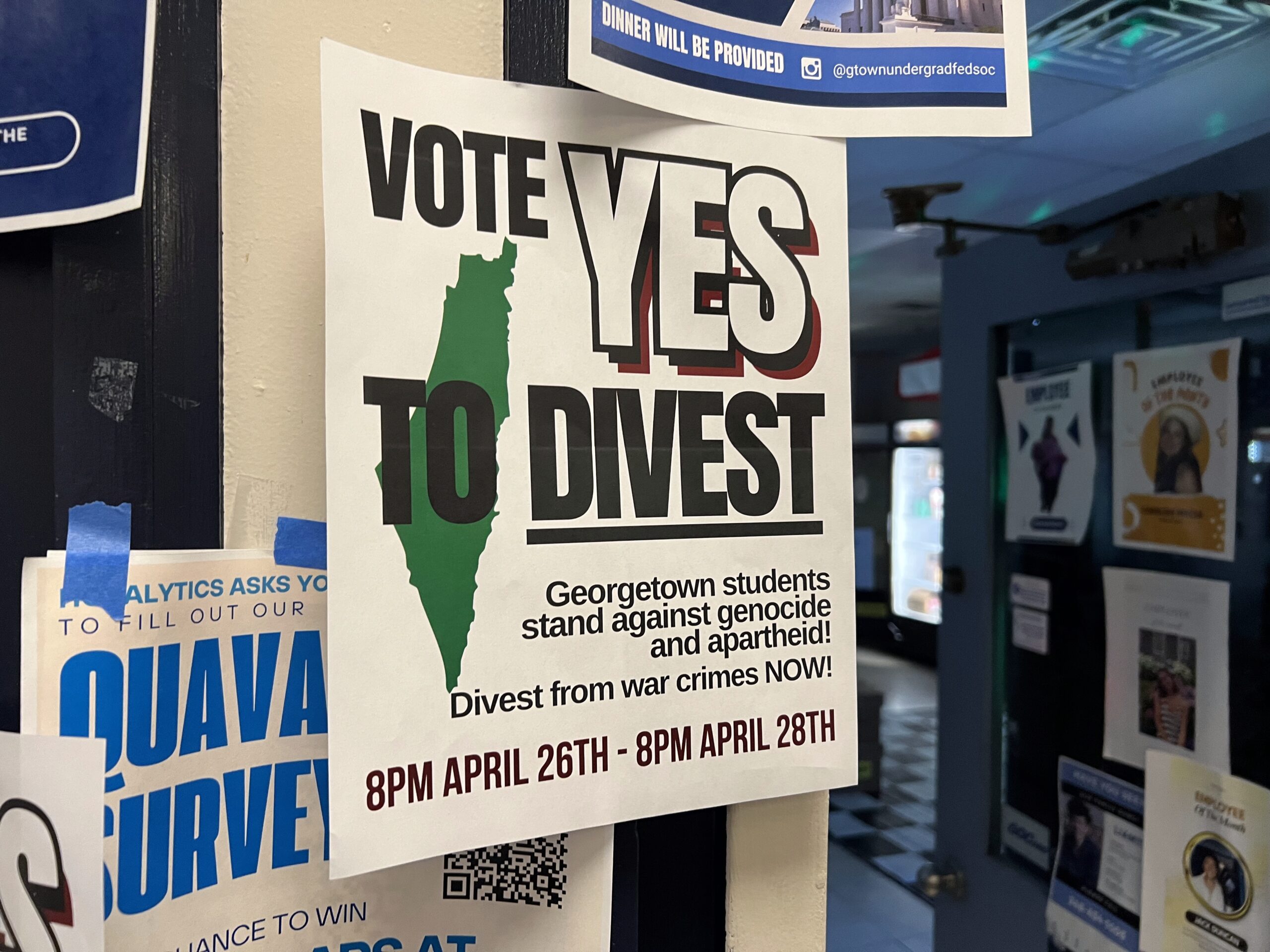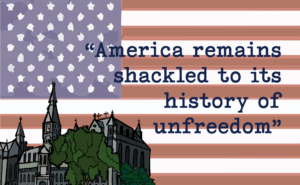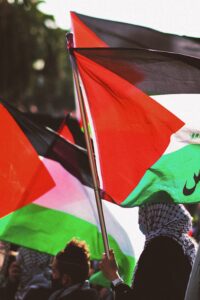Content warning: This article includes mention of genocide.
The “Referendum on Divestment and Transparency” presented to the Georgetown student body by GUSA Senators Meriam Ahmed (SFS ’26) and Sienna Lipton (CAS ’27) concisely outlines the legitimacy of the demand for divestment, Georgetown’s history of divestment from the apartheid state of South Africa, and Georgetown’s present investments in Israel’s genocide. I hope you will first read their words, as mine are merely editorial. Students can vote on this referendum between 8 p.m. on April 26 and 8 p.m. on April 28. At least 25% of the undergraduate student body must vote for the referendum to pass.
Georgetown University’s history is filled with student-led movements representing wider historical moments in the United States. The 1986 student movement for Georgetown to divest from South Africa’s apartheid state resulted in dozens of protestors being arrested, but ultimately succeeded. Even the founding of The Georgetown Voice reflected a national dissatisfaction with the Vietnam War, with this very publication being formed to call out the lack of coverage and apparent apathy of the University toward Vietnam. This is true for universities across America, where students serve as an essential voice in national conversations.
Today, as students, we have the opportunity to directly face our present moment and vocalize our dissent against one of the most brutal colonization campaigns and apartheid regimes in modern history. An overwhelming “Yes” vote on divestment will clearly signal to Georgetown’s administration that students stand against genocide and with the people of Palestine.
For over a year—and in reality for decades before— students around the country have mobilized to express their dissent against Israeli occupation, the United States’ unabashed funding and support of Israel, and their universities’ complicity in the genocide in Gaza. Students have been labeled as extremists and radicals. I ask: What is so radical about advocating for an end to genocide?
Georgetown currently holds over $55 million in public investments in Alphabet and Amazon, which develop technology for the Israeli military through Project Nimbus, and this does not include the university’s private investments. Georgetown, and our tuition dollars, cannot be complicit in genocide. The student body must demand that Georgetown divest itself in full from Israel’s crimes and for a transparent account of all the university’s investments to be made public. Because our tuition dollars are being invested in technology used against Palestinian civilians, we are complicit. We must demand an end to the university’s ties with Israeli academic institutions, such as its partnership with Tel Aviv University. Israeli universities are complicit in Israel’s occupation and genocide, and their collaboration with the Israeli state has lead to Palestinian civil society to call for an international academic boycott.
It is also important to recognize the current suppression of free speech in the United States, particularly related to pro-Palestinian speech. Pro-Palestinian speech has been falsely equated to anti-semitism to justify suppression of protected protest. Under the Trump administration, legal U.S. residents are being deported without due process; Mahmoud Kalil, Rümeysa Öztürk, Georgetown postdoctoral fellow Badar Khan Suri, and countless others have been abducted by Immigration and Customs Enforcement for constitutionally protected speech. The solidarity of our student body with the people of Palestine is paramount regardless, but its urgency is amplified in the face of these blatant attacks on our First Amendment rights. No one is free until we all are free. This is true for the freedom of Palestinians and it is true for the freedom of our community members.
I am writing this from Ireland where I have one month left of my semester abroad. The Irish people’s solidarity with Palestine is based on a common experience of colonization and oppression. Pro-Palestine protests have continued over recent months, including at the Central Bank of Ireland, where protesters demand divestment from Israeli war bonds used to fund weapons that kill hundreds of Palestinians each day. Protesters show disgust and abhorrence of the idea that even a small portion of Irish money invests in guns to kill children, bombs to rip apart human limbs, or any of the other military equipment used to wipe out the Gaza Strip and the Palestinian people.
For students and communities beyond Ireland, it is important to scrutinize institutional investments in a similar way. Just as Irish citizens demand accountability from their financial bodies, Georgetown students must demand transparency and divestment of its tuition dollars from technology targeting civilians.
Another element of Ireland I’ve reflected on, which I’m sure other students abroad in Europe have noticed, is the strength of student unions on campuses. There is a tangible dialogue and expectation of respect that exists between students and school administrators. Student leaders can openly and effectively voice their opinions, with certain students in elected positions given a defined authority to enact policy.
We are far from this type of student democracy at Georgetown with our “student union,” the Georgetown University Student Association (GUSA), kneecapped from achieving real results without administrative approval. This is not to diminish the work of student representatives in GUSA, but rather serves to underline that many of their passed resolutions are hindered by merely being non-binding suggestions. Still, while the results of this referendum may not guarantee an effective and efficient response from the administration (see the GU272 referendum’s history), it is one of the few moments the Georgetown student body can give its opinion in a concise and clear fashion.
As the students of Georgetown enjoy one of the most prestigious and high-quality educations available in the world, every single university in Gaza has been destroyed. School is an impossibility for children in the Gaza Strip. Are we as a university comfortable with these facts? Are we as a student body okay with our bloated tuition being invested in genocide? As a university that proclaims values including “people for others” and “faith that does justice,” how can we not oppose where our money and institutional support is going?
This vote is of extreme importance, but our solidarity with Palestine must not stop here. Our university’s investments are one small sliver of funding that enters Israel and finances its government’s brutality. I hope that this referendum offers a moment of collective voice and an opportunity for the student body to seriously contemplate both what Israel inflicts onto the Palestinian people every day and their own complicity and connection to that violence.
I implore each student to vote “Yes” to divest, and then to make this referendum a topic of conversation, defend your position, and encourage others to vote “Yes” via the GUSA email in your Georgetown inbox starting at 8 p.m. on April 26 until 8 p.m. April 28.
Editor’s note: This article was written by a junior undergraduate student currently studying abroad who requested anonymity due to concerns about reentering the country. The views expressed in this article belong to the author.






